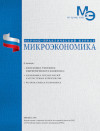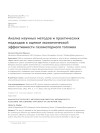Analysis of scientific methods and practical approaches to assessing the economic efficiency of gas motor fuel
DOI: 10.33917/mic-3.104.2022.5-11
The work is devoted to the generalization of scientific methods and practical approaches for choosing an effective gas motorization policy. Domestic and foreign peculiarities of evaluating the economic efficiency of projects in the field of gas motor fuel are disclosed in detail. The author describes the assessment of the environmental and economic benefits of natural gas motor fuel based on the calculation of social costs, the cost-benefit analysis.
The conclusion is made about the insufficient development of the model of the functioning of the gas engine market, cooperation and competitive behavior of participants, methods for assessing its economic efficiency and commercial potential at the national level and the level of economic entities.
References:
1. IvanovA.V., KarpelE.M., SarkisovA.S.Strategicproblemsofusingnaturalgasasa motor fuel. M .: «Publishing House of the Russian State University of Oil and Gas named after.I.M. Gubkin», 2011. 94 p., ill.
2. Ivanov A.V., Karpel E.M., Sarkisov A.S.Evaluation of the corporate and economic (social) efficiency of projects for the sale of natural gas as a motor fuel in vehicles//Oil, gas and business. 2014;4:14-21.
3. Johnson C., Nobler E., Eudy L., Jeffers M. Financial analysis of battery electric transit buses. – National Renewable Energy Lab.(NREL), Golden, CO (United States), 2020. №. NREL/TP-5400-74832.
4. Johnson С. Business Case for Compressed Natural Gas in Municipal Fleets. Technical Report NREL/TP-540-38843. 2006.
5. Karpel E.E., Zubareva V.D., Ivanov A.V. Methods for economic assessment of the effectiveness of gas industry development; Ed. V.D. Zubareva. M.: Oil and gas, 2000. 104 p.
6. Andreev A.F., Dunaev V.F., Zubareva V.D.Fundamentals of design analysis in the oil and gas industry. M.: UMTs of the Ministry of Natural Resources of the Russian Federation, 1997.
7. Barnitt R., K. Chandler L. Eudy 2006, New York City Transit Hybrid and CNG Transit Buses: Interim Evaluation Results, National Renewable Energy Laboratory Report NREL/TP-540-38843.
8. Cohen J.T., Hammitt J.K., Levy J.I. Fuels for urban transit buses: a cost-effectiveness analysis. Environmental Science and Technology 37: 1477–1484. 2003.
9. Kuzina E.A.Updating the regulatory and technical base in the field of operation of gas-engine transport and equipment. Gas industry.2015;S3(728):94-95.
10. Makarova I.V., Khabibullin R.G., Valiev I.I., Gabsalikhova L.M.Transfer of vehicles to natural gas fuel: advantages, prospects, risks. Transport: science, technology, management.2014;1:52-55.
11. India Raises Profile of CNG for Transportation. URL: http://www.ngvglobal.com/blog/india-raises-profile-of-cng-for-transportation-0911.
12. Bagdasarov L.N. Advantages of natural gas as a motor fuel. Gas industry. 2017;10 (759):12-18.
13. Bukharov D.B. The economic effect of the conversion of municipal transport to gas motor fuel. Transport on alternative fuel. 2015;2 (44):37-40.
14. Velnikovsky A.A. Modeling of the infrastructure of automobile gas-filling compressor stations in St. Petersburg. Bulletin of Civil Engineers. 2017;4(63):201-204.
15. Grushevenko E.V., Kapustin N.O., Ryzhkova V.V. Systematic analysis of the prospects for the development of the gas motor fuel market in Russia. Ecological Bulletin of Russia. 2016;6:1-6.
16. Dryuchin D.A., Tishchenko A.S. Assessment of the influence of technological parameters and operational factors on the efficiency of compressed natural gas use in road transport. Intellect. Innovation. Investments. 2017;11:16-19.
17. Kondratenko S.E. Prospects for the use of liquefied natural gas as a motor fuel in Russia. Gas industry. 2017;4(751):76-82.
18. Koryagin M.E., Dekina A.I. Mathematical model for evaluating the efficiency of using liquefied and compressed natural gas as a gas motor fuel for agricultural machinery. Systems. Methods. Technology. 2014;4 (24):93-98.
19. Linnichenko P.S. Evaluation of the economic effect from the transfer of the company’s road transport to compressed natural gas. Bulletin of the Samara State Economic University. 2014;11(121):72-76.
20. Nikolaichuk L.A., Dyakonova V.D. Current state and prospects for the development of the gas motor fuel market in Russia. Internet Journal of Science Studies. 2016;8(2 (33)):65.
21. Nikonov I.D. Methods for stimulating the development of the gas motor fuel market in the Russian Federation. Wschodnioeuropejskie Czasopismo Naukowe. 2016;10(2):123-125.
22. Saveliev G.S., Kochetkov M.N., Ovchinnikov E.V., Uyutov S.Yu. Technical and economic aspects of the use of various types of gas motor fuel in agriculture. Proceedings of GOSNITI. 2017;126:38-43.




